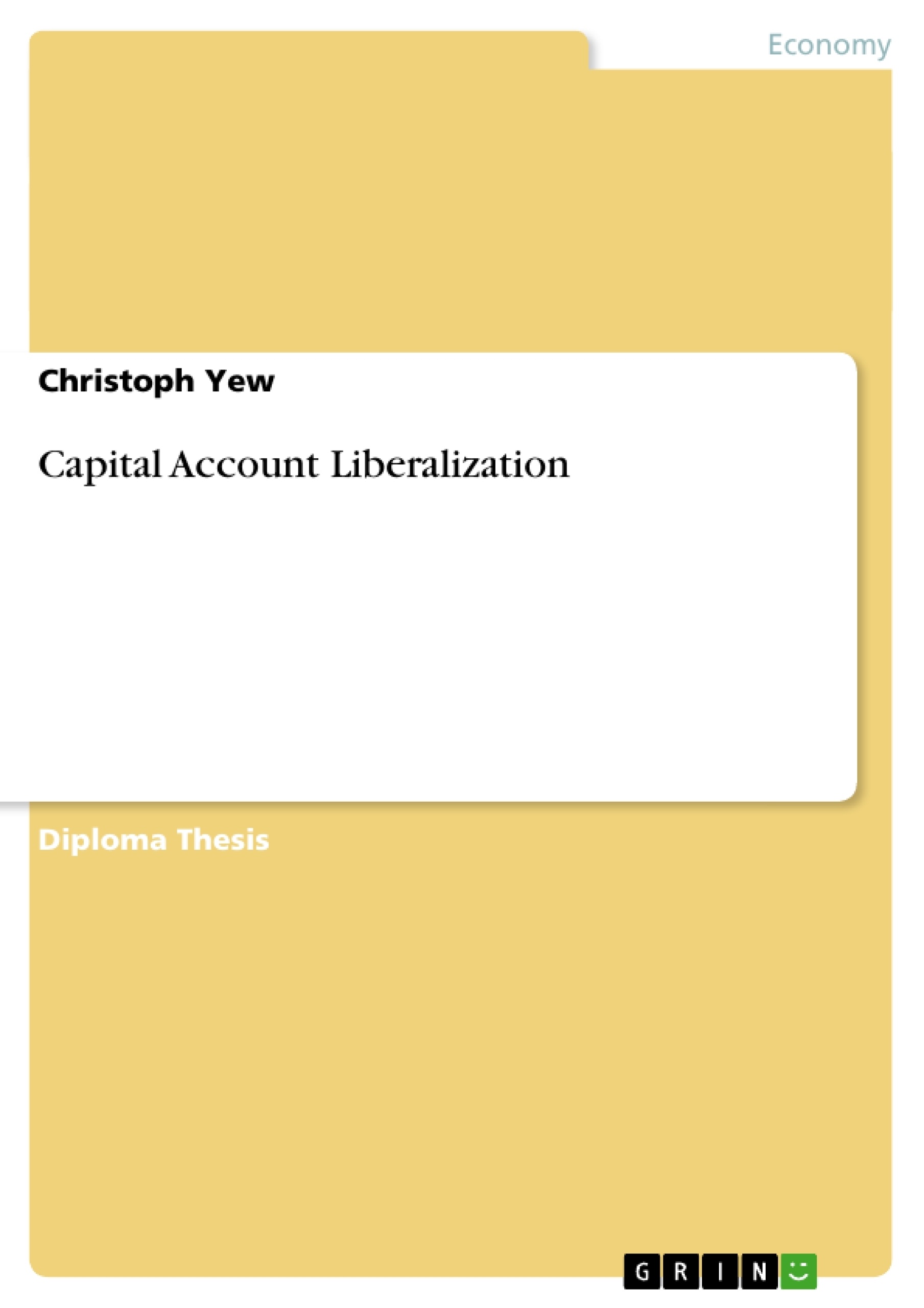
Capital Account Liberalization
Diplomarbeit, 2008
85 Seiten, Note: 2.0
Leseprobe
Inhaltsverzeichnis (Table of Contents)
- 1. Introduction
- 2. History
- 3. Some Fundamental Tools
- 3.1 Definition
- 3.2 Measuring
- 3.2.1 Capital Account Liberalization
- 3.2.2 Effectiveness of Capital Controls
- 3.3 Timing
- 3.4 Composition of Inward Capital Flows
- 4. Theory & Evidence: Capital Account Liberalization and ...
- 4.1 The post-Keynesian Perspective
- 4.2 Allocative Efficiency
- 4.2.1 Revaluation of Stock Prices
- 4.2.2 The Allocation Puzzle
- 4.2.3 Credits and Banks
- 4.3 Macroeconomic Stability
- 4.4 Growth
- 4.4.1 Long and Short-Term Growth
- 4.4.2 Volatility of Growth
- 4.5 Market Failure
- 4.6 Inflation
- 4.7 The Labor Market
- 4.8 Welfare
- 4.8.1 Government Spending and Financing
- 4.8.2 Elusive Gains from Capital Inflows
- 4.8.3 Welfare Distribution among Different Agents
- 4.8.4 The Role of Productivity
- 4.8.5 Rich and Poor Countries
- 4.8.6 Volatility of Consumption
- 4.9 Spillover Effects
- 4.10 Crises & Exchange Rates
- 5. Implications
- 5.1 When Should Capital Account Liberalization Take Place?
- 5.2 Interventions and Capital Controls
- 6. The IMF & Capital Account Liberalization
- 6.1 History
- 6.1.1 1980-1995
- 6.1.2 An Amendment for the Articles of Agreement
- 6.1.3 The Effects of the Asian Crisis
- 6.2 Consistency
- 6.2.1 Different Policy Issues
- 6.2.1.1 Exchange Rate Policy
- 6.2.1.2 Capital Controls
- 6.2.2 Overview
- 6.2.1 Different Policy Issues
- 6.1 History
Zielsetzung und Themenschwerpunkte (Objectives and Key Themes)
This paper aims to analyze the complex issue of capital account liberalization, examining both theoretical frameworks and empirical evidence. It explores the historical development of liberalization policies in various countries and investigates the IMF's evolving stance on the topic. The study considers the impact of liberalization on various macroeconomic aspects.
- The theoretical and empirical evidence surrounding capital account liberalization.
- The impact of capital account liberalization on macroeconomic stability and growth.
- The role of the IMF in shaping policies related to capital account liberalization.
- Analysis of different perspectives on the effects of capital account liberalization, including the post-Keynesian view.
- Examination of the relationship between capital account liberalization and financial crises.
Zusammenfassung der Kapitel (Chapter Summaries)
Chapter 1: Introduction introduces the topic of capital account liberalization and highlights its complexities and controversies, emphasizing the inconsistencies between theory and empirical evidence across various economic areas.
Chapter 2: History (presumably) provides a historical overview of capital account liberalization across different countries.
Chapter 3: Some Fundamental Tools defines and details methods for measuring capital account liberalization, including different indices and their limitations. It also discusses the timing and composition of capital inflows.
Chapter 4: Theory & Evidence: Capital Account Liberalization and ... delves into theoretical perspectives (such as the post-Keynesian perspective) and empirical evidence on the effects of capital account liberalization on various macroeconomic factors like allocative efficiency, macroeconomic stability, growth, inflation, the labor market, and welfare.
Chapter 5: Implications explores the implications of the findings, considering when liberalization might be appropriate and the role of interventions and capital controls.
Chapter 6: The IMF & Capital Account Liberalization examines the historical evolution of the IMF's position on capital account liberalization, including its policy changes and the influence of various crises.
Schlüsselwörter (Keywords)
Capital account liberalization, macroeconomic stability, economic growth, financial crises, IMF policies, post-Keynesian economics, capital controls, allocative efficiency, welfare, labor market, empirical evidence.
Frequently Asked Questions
What is capital account liberalization?
It is the process of removing restrictions on the movement of capital across a country's borders, allowing access to international financial markets.
How does liberalization affect economic growth?
Theory suggests it improves allocative efficiency, but empirical evidence is inconsistent, showing both long-term benefits and short-term volatility.
What is the link between liberalization and financial crises?
Liberalization can lead to increased vulnerability to external shocks and speculative attacks, as seen in the Asian financial crisis of the late 1990s.
What is the IMF's stance on capital account liberalization?
The IMF historically promoted liberalization but has become more cautious over time, acknowledging the need for proper timing and capital controls in certain situations.
What are the "elusive gains" from capital inflows?
It refers to the fact that expected welfare and productivity increases do not always manifest equally across different agents or sectors in a country.
Details
- Titel
- Capital Account Liberalization
- Hochschule
- Universität Osnabrück (Fachbereich Außenwirtschaft)
- Note
- 2.0
- Autor
- Dipl.-Kfm. Christoph Yew (Autor:in)
- Erscheinungsjahr
- 2008
- Seiten
- 85
- Katalognummer
- V119837
- ISBN (eBook)
- 9783640233489
- ISBN (Buch)
- 9783640653560
- Dateigröße
- 977 KB
- Sprache
- Englisch
- Schlagworte
- Capital Account Liberalization
- Produktsicherheit
- GRIN Publishing GmbH
- Preis (Ebook)
- US$ 38,99
- Preis (Book)
- US$ 50,99
- Arbeit zitieren
- Dipl.-Kfm. Christoph Yew (Autor:in), 2008, Capital Account Liberalization, München, Page::Imprint:: GRINVerlagOHG, https://www.diplomarbeiten24.de/document/119837
- Autor werden
- Ihre Optionen
- Vertriebskanäle
- Premium Services
- Autorenprofil
- Textarten und Formate
- Services für Verlage, Hochschulen, Unternehmen

- © GRIN Publishing GmbH.
- Alle Inhalte urheberrechtlich geschützt. Kopieren und verbreiten untersagt.
- info@grin.com
- AGB
- Open Publishing
Der GRIN Verlag hat sich seit 1998 auf die Veröffentlichung akademischer eBooks und Bücher spezialisiert. Der GRIN Verlag steht damit als erstes Unternehmen für User Generated Quality Content. Die Verlagsseiten GRIN.com, Hausarbeiten.de und Diplomarbeiten24 bieten für Hochschullehrer, Absolventen und Studenten die ideale Plattform, wissenschaftliche Texte wie Hausarbeiten, Referate, Bachelorarbeiten, Masterarbeiten, Diplomarbeiten, Dissertationen und wissenschaftliche Aufsätze einem breiten Publikum zu präsentieren.
Kostenfreie Veröffentlichung: Hausarbeit, Bachelorarbeit, Diplomarbeit, Dissertation, Masterarbeit, Interpretation oder Referat jetzt veröffentlichen!
- GRIN Verlag GmbH
-
- Nymphenburger Str. 86
- 80636
- Munich, Deutschland
- +49 89-550559-0
- +49 89-550559-10
- info@grin.com
-









